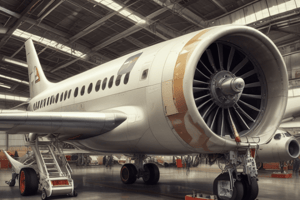Podcast
Questions and Answers
What is the primary focus of aircraft cleaning?
What is the primary focus of aircraft cleaning?
- Thorough sanitation for passenger safety (correct)
- Maximizing the speed of the aircraft
- Aesthetic appeal of the aircraft interior
- Enhancing the in-flight entertainment systems
Which of the following is NOT a key practice in aircraft cleaning?
Which of the following is NOT a key practice in aircraft cleaning?
- Proper waste management
- Frequent cleaning and disinfection of high-contact surfaces
- Regular carpet vacuuming
- Utilizing the newest in-flight entertainment technology (correct)
What is one of the benefits of regular aircraft cleaning?
What is one of the benefits of regular aircraft cleaning?
- Improved flight crew training
- Enhanced longevity and performance of the aircraft (correct)
- Increased fuel efficiency
- Greater passenger load capacity
How does aircraft cleaning contribute to passenger comfort?
How does aircraft cleaning contribute to passenger comfort?
What is a potential consequence of poor aircraft cleaning practices?
What is a potential consequence of poor aircraft cleaning practices?
What are some potential health effects of chemical disinfectants on personnel?
What are some potential health effects of chemical disinfectants on personnel?
What kind of damage can highly corrosive disinfectants inflict?
What kind of damage can highly corrosive disinfectants inflict?
Why are airborne disinfectants a concern in poorly ventilated areas?
Why are airborne disinfectants a concern in poorly ventilated areas?
Which of the following describes the effect of chemical disinfectants on equipment?
Which of the following describes the effect of chemical disinfectants on equipment?
What is a common issue associated with the use of disinfectants in closed environments?
What is a common issue associated with the use of disinfectants in closed environments?
Flashcards are hidden until you start studying
Study Notes
Aircraft Cleaning Practices
- Thorough sanitation is essential for ensuring passenger safety during flights.
- Frequent cleaning and disinfection target high-contact surfaces to minimize germ spread.
- Regular vacuuming of carpets helps maintain cleanliness and hygiene.
- Proper waste management prevents unsanitary conditions and unpleasant odors.
- Strict food hygiene protocols are followed to ensure safe consumption onboard.
- Water used in aircraft remains safe through rigorous testing methods.
Benefits of Aircraft Cleaning
- Enhanced longevity and performance of aircraft are achieved, reducing repair and replacement costs.
- Improved passenger comfort contributes to a more enjoyable flying experience.
- Germ elimination practices decrease the likelihood of passengers falling ill.
- Long-term cost savings are realized through proactive preventive maintenance strategies.
Hazards of Chemical Disinfectants
- Chemical disinfectants often irritate skin, eyes, and respiratory system.
- Highly corrosive disinfectants pose serious risks if they contact skin or eyes, potentially causing severe injuries.
- Airborne disinfectants can lead to respiratory issues, especially in poorly ventilated environments.
- Proper ventilation is crucial when using disinfectants to minimize health risks.
- Personnel must wear appropriate protective equipment when handling these chemicals to prevent exposure.
- Awareness of the specific hazards associated with each disinfectant is vital for safe use.
Studying That Suits You
Use AI to generate personalized quizzes and flashcards to suit your learning preferences.




